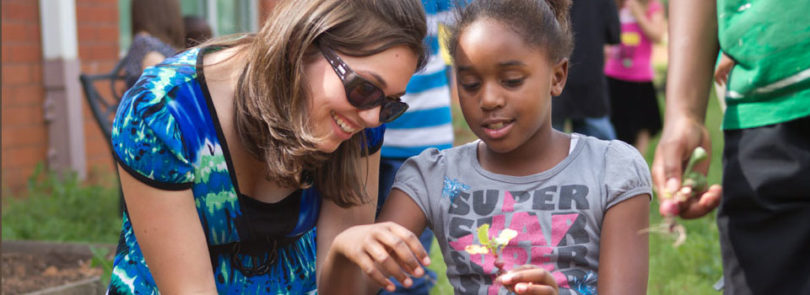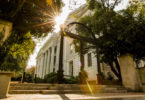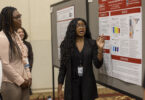The carrot might well be made of gold as tightly as Makayla Vaughan holds onto it. Fresh from a garden at Alps Road Elementary School in Athens, the carrot, along with lettuce and spinach also plucked from the garden bed, will be part of Makayla’s dinner.“I’m going to use them in a salad,” the 10-year-old says. The three UGA students standing nearby are pleased. Their semester-long effort to teach the school children the nutritional value of fresh vegetables, as well as how to grow and eat them, is paying off. “I’ve never seen kids go so crazy over a vegetable,” says Natalie Bouyett, a junior nutrition major from Woodstock.
During the spring, UGA students from three schools or colleges—horticulture, social work and family and consumer sciences—traveled to five Athens area elementary schools to teach children about healthy eating, nature and sustainability. Co-directed by Shari Miller, an assistant professor of social work; David Berle, an associate professor of horticulture; and Jung Sun Lee, an assistant professor of food and nutrition, it was one of 297 service-learning course sections offered to UGA students during the 2010-11 academic year. Academic service-learning courses allow students to participate in hands-on service activities designed to encourage community engagement, enrich student learning and provide benefit to communities.
Students in Cecilia Herles women’s studies class “Environment, Gender, Race, Class” developed a service-learning project to address the environmental issue of food waste and the issue of food insecurity in the Athens community. The students identified grandparents raising their grandchildren as a population that has trouble putting enough food on the table for the family. Grandparents often have no access to public assistance for their grandchildren because they are not legal guardians.
In the spring, the students organized the UGA Campus Community Kitchen, modeled after a national program run by students who collect excess food and deliver it to hungry people in their communities. Herles laid out the ingredients for the program, but her students did the rest. They partnered with the Athens Community Council on Aging to access grandparents who needed help.
In March, the class had everything in place to open the community kitchen. They picked fresh produce from UGarden, a student-run community garden on UGA property, and gathered food donations from sororities and local restaurants. After preparing meals for six hours, they delivered food to 16 families.
The idea of formal service-learning programs at UGA began in 1997, soon after President Michael F. Adams arrived on campus.
In 2002, a service-learning committee was established by the vice president for instruction and the vice president for public service and outreach. The following year, this committee submitted a proposal, “Increasing Learning Opportunities for UGA Students: Linking Academic Study and Civic Engagement,” to the provost. At the time, there was no money available for an office to coordinate the recommended activities.
A few years later a report from the Task Force on Undergraduate Education recommended an Office of Service-Learning. The offices of the vice president for public service and outreach and the vice president for instruction partnered to create the office in 2005.
Service learning was not entirely new to the campus. A number of faculty had included community outreach as part of their academic programs for years, Wilder says. But the offerings have greatly expanded since the university began providing institutional support for the programs.








